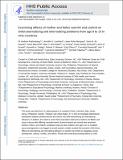Examining effects of mother and father warmth and control on child externalizing and internalizing problems from age 8 to 13 in nine countries

View/
Publication Date
2020Author
W Andrew Rothenberg, Jennifer E Lansford, Liane Peña Alampay, Suha M Al-Hassan, Dario Bacchini, Marc H Bornstein, Lei Chang, Kirby Deater-Deckard, Laura Di Giunta, Kenneth A Dodge, Patrick S Malone, Paul Oburu, Concetta Pastorelli, Ann T Skinner, Emma Sorbring, Laurence Steinberg, Sombat Tapanya, Liliana Maria Uribe Tirado, Saengduean Yotanyamaneewong
Metadata
Show full item recordAbstract/
This study used data from 12 cultural groups in 9 countries (China, Colombia, Italy, Jordan, Kenya, Philippines, Sweden, Thailand, and United States; N = 1,315) to investigate bidirectional associations between parental warmth and control, and child externalizing and internalizing behaviors. In addition, the extent to which these associations held across mothers and fathers and across cultures with differing normative levels of parent warmth and control were examined. Mothers, fathers, and children completed measures when children were ages 8 to 13. Multiplegroup autoregressive cross-lagged structural equation models revealed that evocative child-driven effects of externalizing and internalizing behavior on warmth and control are ubiquitous across development, cultures, mothers, and fathers. Results also reveal that parenting effects on child externalizing and internalizing behaviors, though rarer than child effects, extend into adolescence when examined separately in mothers and fathers. Father-based parent effects were more frequent than mother effects. Most parent- and child-driven effects appear to emerge consistently across cultures. The rare culture-specific parenting effects suggested that occasionally the effects of parenting behaviors that run counter to cultural norms may be delayed in rendering their protective effect against deleterious child outcomes
Collections
- Department of Psychology [216]
